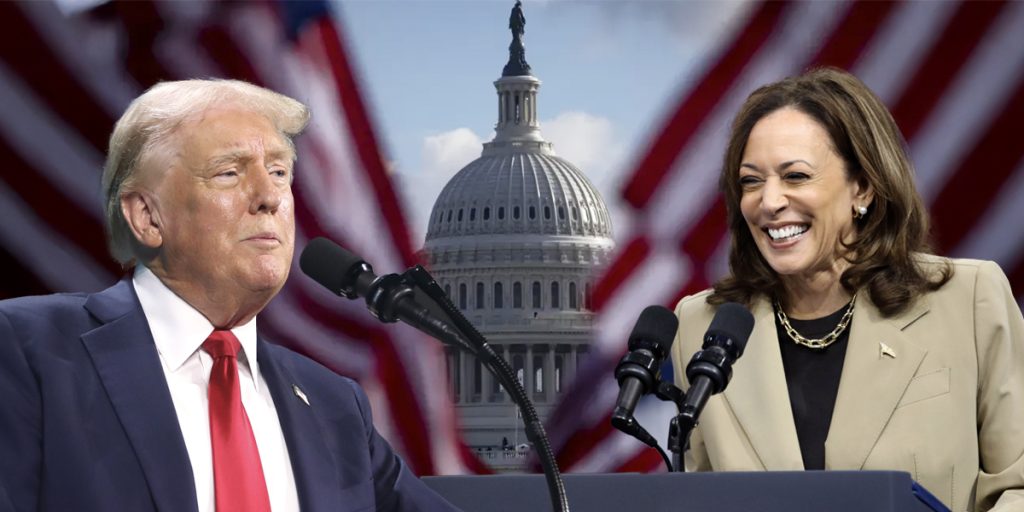The US is the largest global economy, the biggest trader and the most influential military power.
Each state is bigger than most countries, with countless economic resources.
The superpower has a stake in the majority of conflicts, social changes and pop culture events.
Every step the US takes has an immediate impact on the global picture.

The internal consequences of the upcoming election have been considered, but what about the wider world?
The UK
Trump has been at Prime Minister Keir Starmer’s throat before the election has even won by either side.
Trump’s Republican party accused Labour of election interference by sending staff to campaign in Harris’s favour at important “battleground states”.
When Starmer was merely a prospective Prime Minister, he reinforced the “special relationship” between US and UK leaders and how that must be honoured no matter who is chosen to win.
The key area of cooperation concerns foreign policy. The Biden administration worked closely with both Conservative and Labour governments to coordinate a strategic plan to delivering aid in Gaza and Ukraine, and the hopes are the “special relationship” will offer greater advancements.
Trump has labelled himself Israel’s “protector” but has already refused to commit when approving additional aid to Ukraine.
Meanwhile, Harris has said ending both wars “takes as long as it takes”.
Whatever the US decides, the UK may have little choice but to follow suit.
Trump’s “America first” policy includes raising taxes to an extent which could be damaging for important UK sectors. Harris has equally put more focus into domestic issues than international concerns by prioritising national improvements to infrastructure and healthcare.
Europe
All eyes are on what solutions the new US president might offer to the damaged European economy.
While Trump plans to introduce a 10% levy on all foreign-made goods, Harris promised to mitigate the economic sanctions placed on allies.
Rising tariffs will also accelerate inflation rates as goods will become more expensive, whereas Harris’s approach to the economy will likely trigger more internal, national debt than international repercussions.
During his first administration, Trump fostered relationships with some leaders who remain in power. Trump’s interactions with Emmanuel Macron involved a process of mutually assured insults, with Trump calling Macron “foolish” and Macron branding Trump “brain dead”.
Macron has even tried to sway Trump on key climate change policies which this next administration is unlikely to act on.
A Harris administration will appeal to those pleased with how Biden interacted with EU figureheads. Harris craves international dynamics built on rules and convention, encouraging European nations to continually increase defence spending and cooperate on important issues.
Trump would be more hostile, having claimed in 2019 that the EU is “worse than China, just smaller”.
Asia
Tempestuous relationships between Trump and other leaders, established in his first tenure, extend further afield than Europe. His dynamic with North Korea’s Kim Jong Un was troublesome, jumping from arguments over who had the bigger nuclear button to historic meetings.
Critics accused Moscow of interference in the 2016 election, but Russian spokespeople have argued Vladimir Putin vouches for the “more predictable opponent” in Harris.
China, considered the current biggest rival economy, is set to face greater trade restrictions following increased ambition in scientific and technological innovations.
Elsewhere
Washington is set to change very little about its relationship with Africa, where deep-rooted continuity has persevered regardless of Democrat or Republican control.
Both administrations have tried to use Africa to sway opinions of African-American voters in recent years, however, with Biden’s 2022 strategy to grant Africa an increased voice on the international stage.
Trump replicated these policies with Project 2025, paying close attention to Africa’s increasing strategic importance.
Biden has been proactive in climate policy by re-entering the US into the Paris agreements and working hard to keep the country on track with its climate targets.
Trump, meanwhile, dismisses climate change as a hoax “created by and for the Chinese”. His priorities largely focus on the economy, perceiving increased investment into offshore wind farms as money which could be spent elsewhere.
Trump has dismissed climate change as “the biggest scam of all time” and wants increased investment into fracking and non-renewable energy resources.
By re-abandoning the Paris agreement, international progress around tackling global warming will be set on the back foot.
Australia, an avid member of climate arrangements, therefore seems to be hoping for a Harris presidency.
Main image courtesy of Daniel Mennerich via Flickr.
